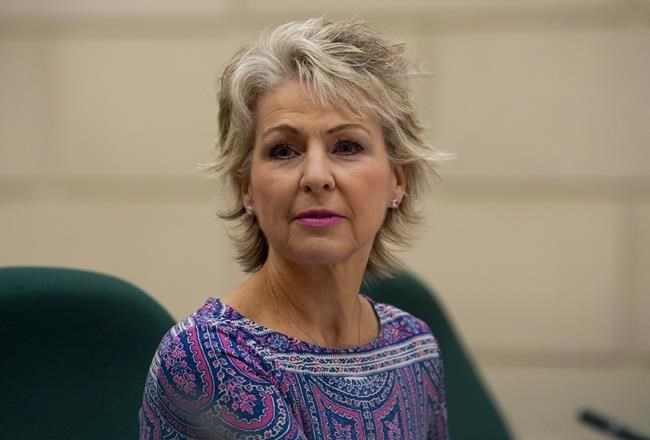
Commissioner of the Correctional Service of Canada Anne Kelly waits to appear before the House committee on public safety and national security on Parliament Hill, Thursday, September 27, 2018 in Ottawa. MPs seeking to understand the circumstances surrounding the death of 22-year-old Quebec woman Marylene Levesque were left with few firm answers as a committee began hearing from witnesses today. THE CANADIAN PRESS/Adrian Wyld
Republished March 10, 2020 - 2:09 PM
Original Publication Date March 10, 2020 - 9:46 AM
OTTAWA - Seeking to understand the circumstances surrounding the murder of a 22-year-old Quebec woman at the hands of a violent offender out on day parole, federal MPs emerged with few firm answers as a committee began hearing testimony Tuesday.
The country's top parole and correctional officials were grilled by MPs on the public safety committee about Marylene Levesque's murder at the hands of Eustachio Gallese.
Gallese, 51, was on day parole when he killed Levesque, a sex worker, in a Quebec City hotel room on Jan. 22.
He'd met Levesque in June after getting permission from a parole officer the previous spring to visit "erotic massage establishments" — a controversial condition that was revoked by the Parole Board of Canada in September.
Gallese admitted to ignoring that edict when he pleaded guilty to first-degree murder in Levesque's killing in late February.
He said in a statement read in court that he stabbed her 30 times because he was jealous and feared rejection.
Parole officials told the committee on Tuesday that the internal investigation into Levesque's death, as well as another probe by Quebec City police, were ongoing, and that limited their ability to answer specifically on the case.
Correctional Service of Canada Commissioner Anne Kelly assured the committee she'd never heard of a similar condition being granted in her 37 years of service.
"I will be very clear, the service does not approve of offenders using sexual services .... I am in my 37th year of service, and I can say with certainty that this is not a practice that we support as an organization, in terms of how we manage offenders," Kelly said.
But she couldn't say what led one of her employees to grant that permission to Gallese, who was serving a sentence for second-degree murder in the killing of his ex-spouse in 2004.
"I can't speak to the specific case," Kelly repeated under questioning.
In 2006, Gallese was sentenced to life in prison without the possibility of parole for 15 years after he killed his 32-year-old partner, Chantale Deschenes, by beating her with a hammer before repeatedly stabbing her.
As part of his day parole, a risk-management strategy was developed to allow Gallese to meet women to respond to his "sexual needs."
Kelly said she was not aware that Gallese had been granted the right to seek sexual services or that the provision was subsequently rejected until after the murder of Levesque.
Officials also said it was a halfway house employee — where Gallese had been housed on day parole — who was responsible for making sure he was meeting the conditions attached to his release.
Kelly could not say how often this worker had direct contact with Gallese as they were not a correctional services employee.
Kelly said the parole officer who initially devised the plan for massage parlour visits is not supervising any offenders pending the conclusions of the various investigations.
According to his statement in court, Gallese said he began to develop a "certain attachment" to her but by September he found her more distant.
With Gallese's obsession increasing, he said he hatched a plan to kill her and take his own life after a Jan. 11 meeting.
He ultimately turned himself in to police after the killing.
The president of the National Parole Board of Canada, Jennifer Oades, said each decision taken by commissioners was done independently with the rules and the protection of the public in mind.
"Predicting human behaviour is not ... an exact science," she said.
Oades was asked why commissioners didn't revoke Gallese's parole upon discovering in September that he'd been soliciting prostitutes.
"In the end of it, it is an independent decision. They took all the information that they had before them and the decision was made," Oades said. "I'm not here to justify it. I'm not here to condemn it."
The committee has about 10 hours left to study the case, and the Conservatives intend to summon the parole officer and the two commissioners who managed the Gallese case.
"It will take answers and the first day was not very satisfactory," Bloc Quebecois member Kristina Michaud said at the end of Tuesday's hearing.
This report by The Canadian Press was first published March 10, 2020.
News from © The Canadian Press, 2020